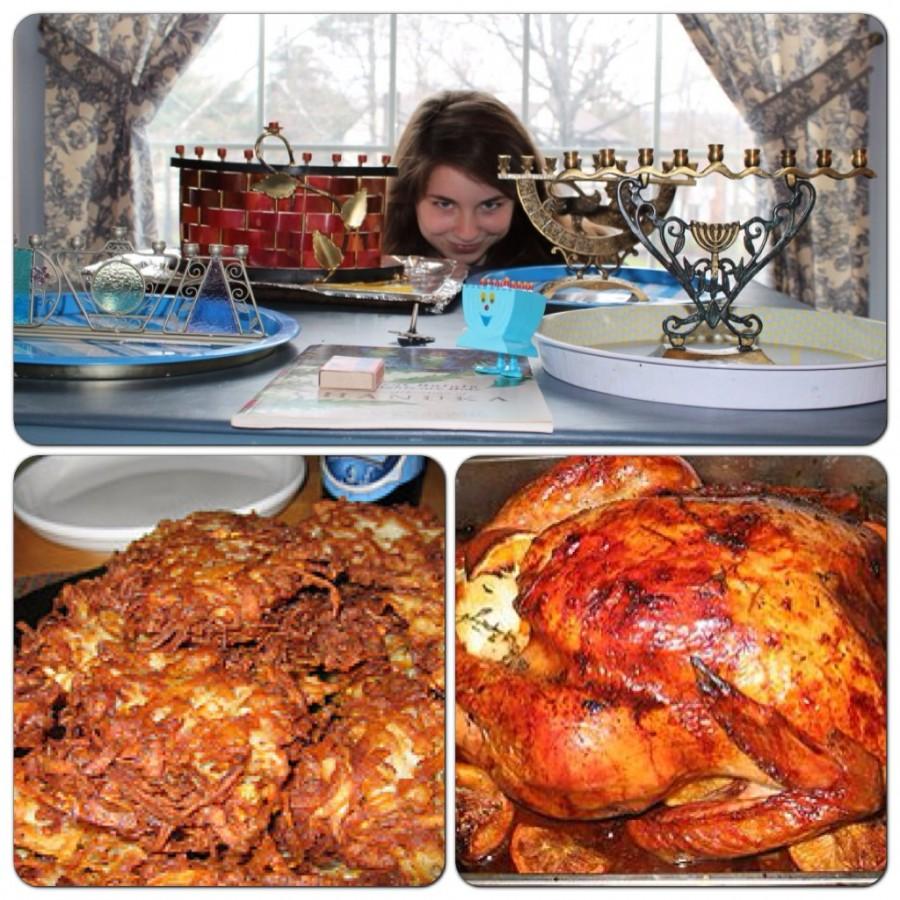A very happy Thanksgiving is in store this year for Jewish Americans. For the first time since 1888 and for the last time until 79811, Thanksgivvukah will be celebrated in many a Jewish American’s home. What is the meaning of this fantastic word? Thanksgivukkah is the name of every food lover’s favorite holidays combined: Thanksgiving and Channukah. Coinciding for one glorious evening, the two holidays are sure to provide great reason for some serious chowing down.
Thanksgiving is one of America’s favorite and most famous holidays. Celebrating the aid the Native Indians gave to the Massachusetts settlers during their first winter in Plymouth, this revered holiday was federalized by Abraham Lincoln. Most are familiar with the controversy over the nature of the relationship between the Natives and the settlers but all is forgotten over delicious dinners of turkey, stuffing, mashed potatoes, and pies.
Hanukkah, a Jewish holiday, tends to be celebrated around Christmastime in the Gregorian calendar. Remembering the unlikely victory of the ancient Jewish Maccabees against the tyrannical Syrians, the so-called “Festival of Lights” is often considered the Jewish Christmas due to the similar gift-giving traditions. Hanukah has gained popularity over the years given it’s location in the English calendar but is actually celebrated during the Hebrew month of Kislev. Given that the Hebrew calendar and Gregorian calendar do not line up (ever wonder why Yom Kippur is a different day every year?), it was by chance that this year the popular holiday landed earlier in the year, lining up with Thanksgiving.
Though many Jewish Americans await this double-holiday-extravaganza with fervor, there has been a little bit of controversy over celebrating the two holidays simultaneously. Various Rabbis have come forward claiming that the stark differences between the holidays give moral reason not to celebrate the two as one. Some preach that Chanukah is traditionally a celebration of the end of a long war in favor of the underdogs, whereas Thanksgiving was drawn from the bloodiness of the Civil War and the cruel conquest of the natives. Nevertheless, both holidays celebrate the conclusion of a war and the survival of a people in the face of dire conditions. Despite some small protests, the dinner recipes and decoration ideas continue to sprout up on the Internet as Jewish Americans prepare for the holiday.
The more pressing question, however, is how one spells “Thanksgivukah.” Many are well aware of the annual struggle to determine how to spell Channukah. Is it Channukah or Chanukkah? Hanuka or Hannukah? Channukkah or Hannukkah or Hanukkah or Chanukah? Or is it Januka, as Spanish-speaking Jews would argue. The struggle to spell prevails as Jewish Americans try to post about their excitement for this holiday on social media networking sites, unsure of how to combine the two words. Should Thanksgivvukah have two “v”s or two “k”s? Should the “h” be tacked on the end? Is there an “a” or a “u” after the “v”s? How many of those are there again? No one is quite sure, just as they aren’t quite sure how to roast a turkey and fry latkes and deal with their hovering mother-in-law without going absolutely mental on the big day. Oy vey.
For more satire on this awesome holiday, check out the Colbert Report: http://www.colbertnation.com/the-colbert-report-videos/429620/october-08-2013/thanksgiving-under-attack—hanukkah
For any and all questions on the spelling of Channukah:
http://www.youtube.com/watch?v=R7JiDBi_v4c
http://www.buzzfeed.com/louispeitzman/best-ways-to-spell-hanukkah
Sources:
http://www.huffingtonpost.com/rabbi-daniel-brenner/why-i-will-not-be-celebra_b_4221034.html
http://www.huffingtonpost.com/rabbi-mishael-zion/a-thanksgivukkah-manifest_b_4214556.html
http://newsfeed.time.com/2013/11/01/everything-you-need-to-know-about-thanksgivukkah/
